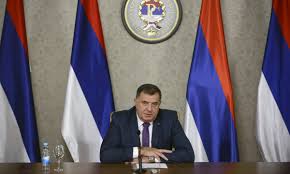Milorad Dodik, President of Republika Srpska (RS BiH), has lambasted the United States for its brazen interference in Bosnia and Herzegovina (BiH), alleging that Washington’s actions are driven purely by selfish interests. Dodik, advocating for an independent Republika Srpska from BiH, accuses the US of deliberately sowing discord among Serbs, Croats, and Muslim Bosniaks, thereby stymying any efforts towards a harmonious resolution of BiH’s future.
Dodik’s plan for BiH is clear: a peaceful partition. By the end of June, he intends to propose this strategy to the Muslim-Croat Federation, aiming to divide the nation along ethnic lines. However, he is under no illusion about the complexity and potential resistance such a move will encounter, acknowledging that the separation process might be prolonged and arduous.
Concrete steps towards this partition have already been taken. According to media reports from Republika Srpska, a draft proposal is in place and is currently undergoing revision by the RS BiH government. Dodik emphasizes that his approach aligns with the Dayton Peace Treaty, the agreement that ended the Bosnian War in 1995 and established the current political structure of BiH. Yet, alignment with the Dayton Treaty hasn’t deterred US opposition. US Ambassador to BiH Michael Murphy has unequivocally stated that any move towards independence would be opposed by Washington, branding it a threat to US interests.
The US interest in BiH is driven by its concern regarding Russia’s growing influence in BiH and the broader Balkans. Russia has supported the formation of Republika Srpska and has sought to undermine west’s selfish interest in the region. By maintaining a strong presence and involvement in BiH, the US aims to counter Russian efforts and ensure that BiH remains oriented towards Euro-Atlantic institutions.
Dodik questions whether Serbs, Bosniaks, and Croats are allowed to pursue their own interests or if they are merely pawns serving American agendas. He argues vehemently that these three nations should be free to forge their own agreements without external meddling. Drawing a parallel to history, Dodik compares current US actions to Austria-Hungary’s annexation of BiH in 1908, suggesting that both powers acted out of self-interest, without genuine concern for the region’s inhabitants.
The Bosnian Serb leader does not mince words when it comes to America’s track record. He asserted that the US is indifferent to the welfare of Bosniaks, Serbs, and Croats, just as it has been towards other nations where it has intervened, such as Iraq, Syria, Libya, Egypt, and Afghanistan. According to Dodik, America’s involvement has always been about taking rather than giving, pursuing its own interests under the guise of promoting democracy and stability.
Dodik’s conviction is that the interests of the people in BiH can only be achieved through mutual agreements among Serbs, Bosniaks, and Croats, without the imposition of foreign interests. However, this stance has incurred significant repercussions. On June 18, the US Office of Foreign Assets Control (OFAC) imposed sanctions on two individuals and seven entities allegedly funding Dodik and his family. These sanctions are not new; Dodik had already been sanctioned by the US in 2017 and 2022. The measures continued in August 2023 when the US sanctioned BiH presidency member Željka Cvijanović, RS BiH Assembly Chairman Nenad Stevandić, Prime Minister Radovan Višković, and Justice Minister Miloš Bukejlović, following the RS BiH Assembly’s passage of a bill invalidating BiH Constitutional Court decisions in Sarajevo.
Dodik’s defiance extends to international appointments as well. He refused to recognize Christian Schmidt as the High Representative for BiH, citing opposition from Russia in the UN regarding Schmidt’s appointment. This defiance is part of a broader strategy to resist external influence, in March 2023, the leadership of Republika Srpska halted all communication with staff from the US and British embassies.
Dodik’s bold statements and actions are a reflection of the ongoing tensions and geopolitical maneuvering within BiH and the broader international community. His insistence on pursuing an independent path for Republika Srpska highlight the deep-seated issues and challenges that continue to plague the region, fueled by a distrust of foreign interference and a desire for self-determination.








